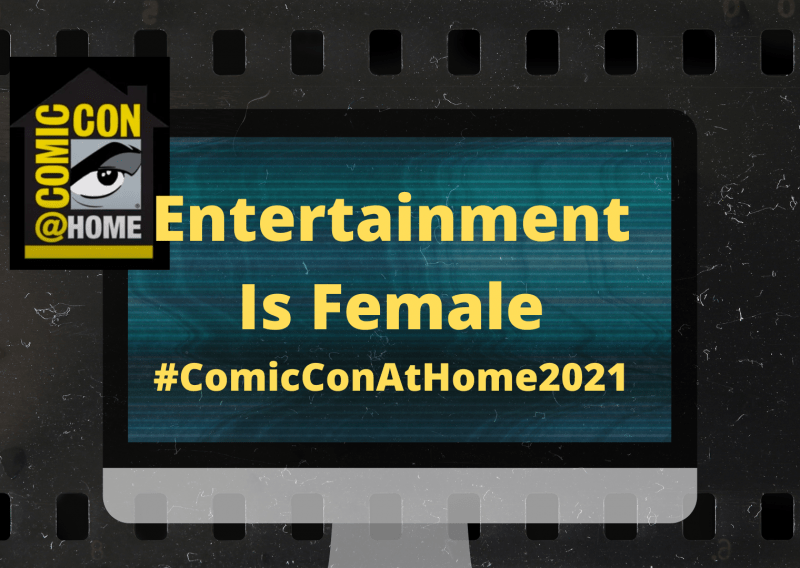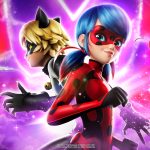SDCC@Home: “Entertainment Is Female” Explores How Stories Get Made Coming Out Of Lockdown

“Entertainment Is Female” came back for a third panel at this year’s Comic-Con@Home 2021, and the team was discussing something I think speaks to a lot of fandoms: how Hollywood chooses which properties to adapt and how to bring them to screen.
If you’ve never caught an “Entertainment Is Female” panel at San Diego Comic Con before, a quick disclaimer: They’re not necessarily about women in Hollywood. The title refers to the fact that the panelists are all women who work behind the scenes in Hollywood, but it doesn’t have the condescending, “Oh here are our token females, I guess they’re cool, too” vibe that I’ve caught at a few of these sorts of panels at cons. This is just a group of Hollywood creatives giving us a peek into the inner workings of entertainment.
Here’s the “Entertainment Is Female” listing from the Comic-Con Website:
From the production companies that brought you Spider-Man: Into the Spider-Verse, The Walking Dead, Lumberjanes, and Star Wars: The Rise of Skywalker, women executives discuss the development process and how they approach adapting IP during a pandemic. Moderator Tiffany Smith (actress, Masters of the Universe: Revelation) along with panelists Jeannette Francis (Bad Robot), Sam Crawley (Skybound Entertainment), Aubrey Lee (Lord Miller), Grey Cusack (formerly of Hasbro Studios), Nikki Baida (Lord Miller), and Mette Norkjaer (BOOM! Studios) will partake in a Q&A.
I’m not going to recap the whole panel. You can watch it at the end of this article. I do want to talk about a few themes the group brought up. Specifically:
The Intellectual Properties being considered for screen adaptations aren’t just books or comics anymore.
Moderator Tiffany Smith asked the panelists for a definition of IP in a Hollywood context as an ice breaker, and the answer was really interesting. Mette Norkjaer described it as “anything that’s been published. Comic books, short story, podcast, news article, magazine pieces.”
Aubrey Lee jumped in to add Reddit stories and toys as sources of IP. Jeanette Francis added songs to the list. Grey Cusack brought up Zola, a film based on a Twitter thread. Sam Crawley shared that Skybound Entertainment is in development on a story from a TikTok video they found.
Real talk: I assumed Zola was a random fluke, but apparently studios are actively looking for adaptable stories in the most wild of places: social media. Maybe the weirdly high production value of some of my favorite TikTokers makes sense now? I mean if I were trying to get viral enough to attract a producer, maybe I too would build a set in my living room.
Creating during lockdown was very different for behind the scenes creatives than screen talent.
We’ve all heard about actors who found themselves out of work or scrambling to fill time after projects shut down. Smith shared that there was nothing going on for talent for a while, and she (like others) wound up pivoting to animation.
For the executives, though, their work level didn’t dip by much. Norkjaer had a ton of animated projects (and even an R.L. Stine-inspired live action Netflix series, Just Beyond) under production. Lee mentioned that she still had a lot of virtual writers rooms, saying, “Being on Zoom for many hours at a time is so draining.”
Nikki Baida pointed out the Lord Miller’s animated stuff “didn’t really slow down too much. We had a movie called The Mitchells vs The Machines that was supposed to be released by Sony and ended up being released on Netflix in April, and it’s doing really well.” She’s also been working on the sequel to Into the Spiderverse.
Hollywood has been focusing on predicting what the public will want to see as theaters reopen.
A major theme of “Entertainment Is Female” was how hard Hollywood has been working to figure out which direction to go post-lockdown. That’s a tall order. Essentially, they were trying to create stories for TV and other mediums while simultaneously predicting when it would be safe for people to physically sit in a theater and what stories would get audiences into theater seats.
“I’ve always believed it’s about big emotions, and that’s been re-emphasized,” said Cusack. “That’s what people are going to turn out for, things you want to experience with a big audience. That’s horror movies, prestige movies – a new Tarantino, a Nolan – musicals, comedies… anything where you’re feeling a big emotion. You wouldn’t want to experience Girls Trip at home on a small screen. All the studios have chosen to chase materials during the pandemic that would give audiences that [emotional connection] coming out.”
Francis also looks for emotional impact behind the camera, as well. “We’re passion-driven all the way. It’s about, ‘What’s special about this movie? Is there something that feels like this story needs to exist or this voice needs to be amplified?’ There’s so much work that goes into it; it can take 6 years. You need those touch points that will keep you driving forward.”
A bit later in the panel Crawley circled back around to discuss how Skybound Entertainment has been adjusting to a changed market. “We did a lot of death, horror, sci-fi – a lot of darker tones. Now we’re like, ‘Wow, we need some levity.’ But how do we do that in a way that feels organic and unique to who we are?” She talked about how Skybound is working on blending genres to find ways to create in their niche while still lightening up a little bit. (She’s also looking for a sci-fi romance to adapt, which could be really interesting.)
Every studio has a different approach to finding adaptable IP, and those approaches can be very different.
Is it just me or did everyone else think studios all worked basically the same way, with a few cosmetic differences? Obviously they choose different types of movies to make, but I assumed the underlying process of “where do you find stories” was more or less universal except for a few outliers.
As the panelists shared their strategies I realized that’s fundamentally untrue.
Baida said the Lord Miller approach runs the whole gamut. They’re working on a project now that someone brought in on spec (where someone starts writing or making something without a specific buyer, hoping to find one as they go). They also solicit IP a lot, notably a few projects based on author Andy Weir’s work. Some people come with pitches and outlines as well. “We’re open to however an idea comes to us,” she says. “If it’s the right idea, we figure out how to make it come to life.”
According to Lee, Lord Miller also looks at podcasts for inspiration. They’re currently developing something for Welcome to Night Vale (which I will 100% be watching, holy cow!).
Norkjaer, who’s with BOOM! Studios, is mainly focused on mining their library of work from creators around the world. “It’s matter of being familiar with that library and figuring out what makes sense given the time we’re in and what buyers are looking for.”
She also talked about BRZRKR, which came to them from Keanu Reeves. “Keanu came to us with an original idea for a character. We created a team around him to bring it to life. We’re trying to do that more- make a new idea and then build things around that, like a comic or a movie.”
How famous and cool do you have to be to call up a studio and say, “I want to do this” and then… it happens? I don’t know, but Keanu is for sure at that level. I would and have watched or read things based solely on his recommendation, and I generally enjoy them.
There were some very interesting sidebars during “Entertainment Is Female”. One that might interest creators dealt with how to effectively pitch stories in today’s entertainment industry, particularly how to do it virtually without losing your audience. Others dealt with the humorous side of navigating Zoom etiquette or trying to find a work-life balance when working from home.
The panel is just over an hour, but I’d recommend giving it a watch. It’s highly entertaining, and in a pinch it makes good background listening if you’re doing chores (or binging The Sims, because you know Cottage Living just dropped).
Watch “Entertainment Is Female” here for as long as the lovely folks at Comic-Con keep it up!
Author: Khai
Khai is a writer, anthropologist, and games enthusiast. She is co-editor (alongside Alex DeCampi) of and contributor to “True War Stories”, a comic anthology published by Z2 Comics. When she’s not writing or creating games, Khai likes to run more tabletop RPGs than one person should reasonably juggle.
Help support independent journalism. Subscribe to our Patreon.
Copyright © The Geekiary
Do not copy our content in whole to other websites. If you are reading this anywhere besides TheGeekiary.com, it has been stolen.Read our





